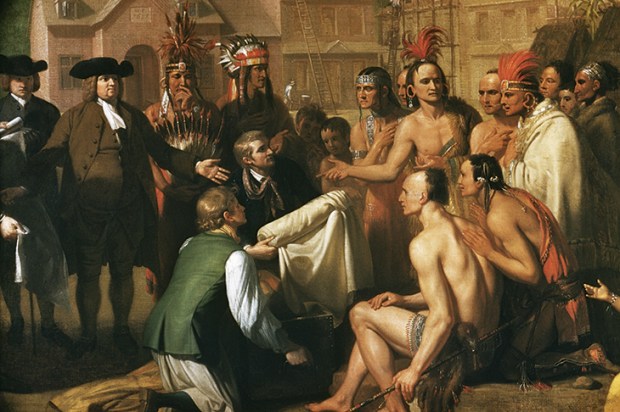The mid-term elections in the US, when Democrats took over Congress, were hailed as a victory for ‘progressives’, while David Cameron once claimed to be a ‘progressive conservative’. Well, progress towards what exactly? ‘It is certainly significant that nearly all political tendencies now wish to be described as progressive,’ wrote the cultural critic Raymond Williams, ‘but it is more frequently now a persuasive than a descriptive term.’ Quite.
That is taken from the seminal 1976 lexicon of political terms, Keywords: A Vocabulary of Culture and Society, in which Williams traced the tangled history of words from ‘anarchism’ to ‘welfare’. The present volume was conceived to update his work and, I suppose, render it more ‘relevant’: a fashionable term of philistinism sadly not interrogated here.
It is quite the brutal, not to say vandalistic, tribute. Williams’s name does not appear on the cover, and the editors have simply binned two-thirds of his entries on the grounds that they have now ‘faded into history’. It is probably wise that they don’t list the discarded material or explain why it is now useless, since on consulting my own dog-eared original I find that among words the progressive modern editors deem defunct are, well, ‘progressive’ — which we started with — as well as ‘reform’, ‘radical’, ‘consensus’, ‘jargon’, ‘management’, ‘science’, and ‘unconscious’. Faded into history?
Let us cast an eye on what our super-modern editors, with their dozen academic contributors, have replaced all that pointless nonsense with. ‘Access’ and its cognates (‘accessibility’) are nicely discussed, pointing out that they often blend wish with fact. It is well observed that ‘diversity’ is ‘a way in which many of the complexities of multi-racial societies are both negotiated and obfuscated’, but the entry for ‘feminist’ is hobbled by the lack of ‘radical’, not to mention the acronym TERF, for ‘trans-exclusionary radical feminist’, which we do not find either in the homiletic entry for ‘trans’. They are good on ‘excellence’: ‘Excellent teaching is specific and implies an overall high standard; excellence in teaching is vaguer.’ And I liked the observation that ‘identity’ is two contradictory things at once: ‘it is what you can’t help being, but also what you choose to become’.
Williams avoided any references to the topical politics of his day, no doubt aware that this would date the book quickly; but our new editors have no such qualms, and they know where they stand. Thus we are told that ‘the British Labour Party largely abandoned any ambition to bring about a more equal society in the 1990s’ (did it?); there are citations from ‘the Black Lives Matter website’ and from the Radio Times; and there are several disapproving references to the Tea Party in America, even though it is already moribund, having been gobbled up by Trumpism. One page employs ‘nuance’ as a verb — the OED, it claims, ‘fails to nuance the value coding of this mainstream current usage’, a sentence which will have poor Raymond Williams spinning in his grave.
The new material, then, is decidedly not flattered by comparison to the 40 original Williams essays that have miraculously survived the editors’ cull, and the contributors seem to know this, and to resent it. In the entry on ‘community’, for example, Williams noted a lasting tension between two senses: ‘On the one hand the sense of direct common concern; on the other hand the materialisation of various forms of common organisation, which may or may not adequately express this.’ The original entries are followed by notes on ‘Recent Developments’, and here the book suddenly condescends to its own inspiration. ‘Williams’s claim that “community” is “never to be used unfavourably” seems exaggerated,’ says the anonymous writer, offering no citations of an unfavourable use. The phrase ‘the intelligence community’, he or she nonetheless complains, is ‘often felt as a mendacious phrase to cover snoops and spies with the good feelings of intimate interpersonal connection’.
Of course this demonstrates that ‘community’ does reliably import ‘good feelings’ just as Williams argued, but what about that peculiar locution ‘felt as’? It is almost as though the writer wants to say that because some people feel ill-disposed towards the noble art of espionage, then the word ‘community’ itself cannot really be acting in the rhetorical way it, in fact, does. Elsewhere we are informed sternly that ‘cultural appropriation’ really is wrong because of some people’s ‘emotional reactions’ to it. That feelings create reality is, of course, the unstated proposition behind what some call the age of post-truth, and much else besides.
The original Keywords was a modest yet profound exercise in seeking to understand culture through philology. This cack-handed appropriation of that legacy is just about demonstrating the correct opinions about everything. To be sure, there is much to be criticised about the overuse these days of ‘virtue signalling’ — but then, you won’t find that phrase here either.
Got something to add? Join the discussion and comment below.
Get 10 issues for just $10
Subscribe to The Spectator Australia today for the next 10 magazine issues, plus full online access, for just $10.
You might disagree with half of it, but you’ll enjoy reading all of it. Try your first month for free, then just $2 a week for the remainder of your first year.














Comments
Don't miss out
Join the conversation with other Spectator Australia readers. Subscribe to leave a comment.
SUBSCRIBEAlready a subscriber? Log in